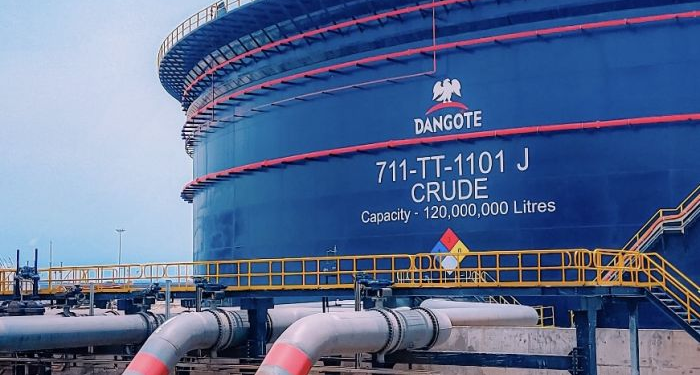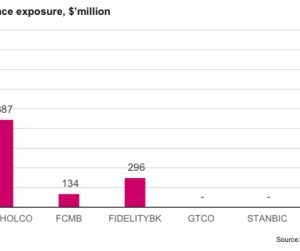The launch of Dangote Petroleum Refinery’s direct distribution of premium motor spirit (PMS) and diesel signals a dramatic transformation for the Nigerian downstream petroleum industry, a move that brings both winners and losers to the table.
Effective August 15, 2025, Dangote’s new delivery policy involves a fleet of 4,000 CNG-powered trucks delivering directly to petrol stations, industrial firms, and other large consumers.
This approach cuts out traditional depot owners, many of whom have long acted as intermediaries and handlers within the petroleum distribution chain. The policy also includes free delivery and generous credit facilities for large volume purchases, adding incentives for a more flexible and cost-effective delivery process.

While the move is expected to benefit marketers, rural filling stations, and large industrial users, it spells trouble for depot owners, import-dependent marketers, truckers, and petrol tanker operators. BusinessDay examines the winners and losers in this seismic shift.
The winners
Independent marketers, rural filling stations
For years, independent petroleum marketers have struggled with supply bottlenecks, exorbitant depot charges, and erratic product availability. Dangote’s direct distribution model bypasses many of these hurdles, allowing marketers—especially those in underserved rural areas—to access products at competitive rates.
“This is a game-changer for us,” said Abubakar Shehu, an independent marketer in Kwara state. “Before, we had to deal with multiple middlemen, delays, and high costs. Now, we can order directly from Dangote and get deliveries faster.”
Rural filling stations, often neglected by major distributors due to logistical challenges, stand to gain significantly. Dangote’s plan includes deploying smaller, more efficient trucks to reach remote locations, ensuring steady supply and reducing fuel scarcity in these areas.
Large industrial users
Manufacturers and other industrial players who rely heavily on diesel and petrol for operations are set to benefit from Dangote’s bulk supply model. By eliminating intermediaries, factories can secure fuel at lower costs, reducing operational expenses.
“Industries spend billions annually on diesel alone,” said Chinedu Okonkwo, an energy analyst. “If Dangote can supply directly at better prices, it will ease production costs and potentially boost Nigeria’s manufacturing output.”
Consumers (potentially)
If the new distribution model succeeds in cutting out middlemen and reducing inefficiencies, consumers could see lower fuel prices in the long run. However, this depends on how much of the cost savings are passed down the supply chain.
The losers
Depot owners
Perhaps the biggest losers in Dangote’s new plan are petroleum depot owners. Traditionally, depots served as critical storage and distribution hubs, charging fees for handling and reselling fuel. With Dangote supplying directly to retailers, many depots—especially those without strong logistics networks—face obsolescence.
“Depot owners who relied solely on storage fees are in trouble,” said an industry insider who requested anonymity. “Dangote’s refinery has its own massive storage capacity, so why would marketers go through depots anymore?”
Some depot operators may pivot into complementary services, but those unable to adapt risk shutting down.
Import-dependent marketers
Marketers who depend on imported petrol will struggle to compete with Dangote’s locally refined products. Nigeria has long relied on fuel imports due to dysfunctional refineries, but Dangote’s 650,000-barrel-per-day refinery is changing that.
“Importers will face higher costs due to forex fluctuations and international market volatility,” said Emeka Eze, an oil sector consultant. “Dangote’s pricing will be hard to match, especially if the refinery achieves economies of scale.”
Truckers, petrol tanker operators
The traditional fuel distribution system relies heavily on long-haul tanker drivers who transport products from depots to stations. Dangote’s model, however, uses a more centralised and tech-driven approach, potentially reducing the need for independent truckers.
“Many tanker drivers could lose business if Dangote uses its own fleet or contracts to select logistics providers,” said Abdullahi Bello, head of a tanker drivers’ association in Apapa, Lagos. “We need to see how this plays out, but it’s a major threat to our livelihoods.”
Industry reactions
The Petroleum Products Retail Outlets Owners Association of Nigeria (PETROAN) said the Dangote Refinery’s forward integration adoption could lead to a monopoly in disguise.
In a statement on Monday signed by Joseph Obele, PETROAN’s national public relations officer, the association said the development could also pose a significant job loss threat to Nigeria.
Obele warned that Dangote’s tactics “may include a pricing penetration strategy, where they reduce prices to capture market share, with the ultimate goal of forcing other filling station operators to quit the market.”
“This could lead to a massive shutdown of filling stations across Nigeria, resulting in widespread job losses,” the statement read.
The association further warned that the introduction of 4,000 new compressed natural gas (CNG)-powered tankers by Dangote refinery “poses a significant threat to the livelihoods of thousands of truck drivers and owners.”
“While CNG trucks may offer a lower cost of transporting petroleum products, this shift could lead to widespread job losses in the industry,” PETROAN said.
The adoption of the strategy by Dangote refinery, the association said, will significantly affect various stakeholders, including modular refineries, as their operations and market share may be threatened by Dangote’s dominance.
“Filling station operators: Many may be forced to shut down due to Dangote’s pricing penetration strategy and dominance,” the statement also read.
“Local suppliers of petroleum products: Their businesses may be negatively impacted by Dangote’s direct supply to end-users.
“Telecom diesel suppliers: Their operations and market share may be threatened by Dangote’s dominance.
“It is obvious that Dangote plans to gain full monopoly of the downstream sector, which would enable the company to exploit Nigeria’s petroleum consumers.”
According to the association, this could lead to higher prices, reduced competition, and decreased economic efficiency.
Stay ahead with the latest updates!
Join The Podium Media on WhatsApp for real-time news alerts, breaking stories, and exclusive content delivered straight to your phone. Don’t miss a headline — subscribe now!
Chat with Us on WhatsApp








